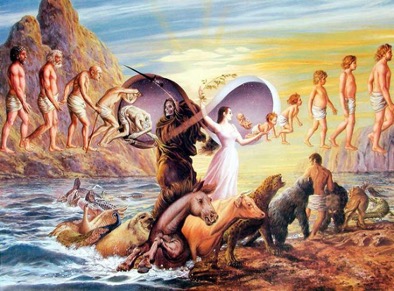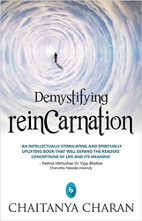- Visitor:26
- Published on:
Reincarnation in Greek and Roman Civilizations. Exploratory Studies in Reincarnation
Reincarnation is sometimes thought of as a belief system peculiar to eastern religious traditions like Hinduism and Buddhism. The fact, however, is that the principle of reincarnation has enjoyed global intellectual appeal and widespread mass acceptance throughout most of known human history.

As part of our series on reincarnation, today, we publish an excerpt from the book “Demystifying reincarnation” by Shri Chaitanya Charan Das Ji. In his book, Shri Chaitanya Charan Das Ji explores the belief in reincarnation in the major civilizations and religions of the world. In this excerpt, the author talks about how reincarnation was viewed by the ancient Greek and Roman civilizations and the pre-Greek European civilization. Read on to learn more.
“Transmigration, dating back to a remote antiquity, and being spread all over the world, seems to be anthropologically innate.”
-M’Clintock and Strong’s Cyclopaedia of Biblical, Theological and Ecclesiastical Literature
Reincarnation is sometimes thought of as a belief system peculiar to eastern religious traditions like Hinduism and Buddhism. The fact, however, is that the principle of reincarnation has enjoyed global intellectual appeal and widespread mass acceptance throughout most of known human history. Let’s look at the prevalence of belief in reincarnation, first in the world’s major civilizations and then in the world’s major religions.
GREEK CIVILIZATION
The Greek civilization, which is the basis of most of modern Western civilization, had many prominent proponents of reincarnation. The best known among the early Greek advocates was the great mathematician and philosopher Pythagoras (circa 570-495 BC)
Pythagoras
Pythagoras stated, “Souls never die, but always on quitting one aboard pass to another. All things change, nothing perishes. The soul passes hither and thither, occupying now this body, now that… As a wax stamped with certain figures, then melted, then stamped anew with others, yet it is always the same wax. So, the soul being always the same, yet wears at different times different forms.”
Pythagoras didn’t just propound reincarnation; he also described his past lives. Diogenes Laertius, whose writings were the key surviving sources for the history of Greek philosophy, stated, “He [Pythagoras] was accustomed to speak of himself in this manner: that he had formerly been Aethalides, and had been accounted the son of Mercury; and that Mercury had desired him to select any gift he pleased except immortality. Accordingly, he had requested that, whether living or dead he might preserve the memory of what had happened to him. While, therefore, he was alive, he recollected everything; and when he was dead, he retained the same memory.
“At a subsequent period, he passed into Euphorbus, and was wounded by Menelaus. While he was Euphorbus, he used to say that he had formerly been Aethalides; and that he had received as a gift from Mercury the perpetual transmigration of his soul; so that it was constantly transmigrating and passing into whatever plants or animals as he pleased; and he had also received the gift of knowing and recollecting all that his soul had suffered in hell, and what sufferings too are endured by the rest of the souls.
“But after Euphorbus died, he said that his soul had passed into Hermotimus; and when he wished to convince people of this, he went into the territory of Branchidae, and going into the temple of Apollo, he showed his shield which Menelaus had dedicated there as an offering.
“For he said that he, when he sailed from Troy, had offered up his shield which was already worn out, to Apollo, and that nothing remained but the ivory face which was on it. He said that when Hermotimus died he had become Pyrrhus, a fisherman of Delos; and that that he still recollected everything, how he had formerly been Aethalides, then Euphorbus, then Hermotimus, and then Pyrrhus. When Pyrrhus died, he became Pythagoras, and still recollected all the circumstances I have been mentioning.”

Orpheus
Prior to Pythagoras, Orpheus, the legendary musician, poet, and prophet who founded the Orphic mystery religions taught that the book holds as a prisoner the immortal soul, which aspires for and achieves freedom after reincarnating over many lifetimes.
Socrates and Plato
After Pythagoras, Socrates (circa 470-399 BC) was the most prominent proponent of reincarnation as can be inferred from various writings of his foremost student, Plato. Reincarnation is a recurrent theme in many of Plato’s works including the Republic, Phaedrus, Meno, Timaeus, Laws and Phaedo.
“I am confident that there truly is such a thing as living again, that the living spring from the dead, and that the souls of the dead are in existence.”
Socrates, as quoted in Plato’s Phaedo
“Every man’s soul has, by the law of his birth, been a spectator of eternal truth, or it would never have passed into this our mortal frame, yet still it is no easy matter for all to be reminded of their past by their present existence.”
Socrates, as quoted in Plato’s Phaedrus
Roman Civilization
After the Greeks came, the Romans, who focussed more on worldly advancement than metaphysical insight. Nonetheless, reincarnation continued to find advocates even among them.
Cicero
The reputed statesman and orator (106 – 43 BC) said in his book Scipio’s Dream, “Know that it is not thou, but thy body alone, which is mortal. The individual in his entirety resides in the soul, and not in the outward form. Learn, then, that thou art a god; thou, the immortal intelligence which gives movements to a perishable body, just as the eternal God animates an incorruptible body.”
Ovid
The poet Ovid (43 BC – 17 AD) said, “Nothing perishes, although everything changes here on earth; the souls come and go unendingly in visible forms; the animals which have acquired goodness will take upon them human form”
Plotinus
The Roman philosopher Plotinus, who was the leading representative of Neo-Platonism (205 – 270) wrote, “Such things….As happen to the good without justice, as punishments or poverty or disease, may be said to take place through offences committed in a former life.”
Reincarnation continued to be taught in the Platonic Academy for over nine centuries till the time of Plato’s last successor, Damascius, who taught it till 529 A.D. In that fateful year, the Christian Emperor Justinian persecuted Damascius and shut down the Academy. Thereafter, as Europe became increasingly Christianised the teaching of reincarnation slowly went underground.
EUROPEAN CIVILIZATION – PRE-GREEK
The Druids
The Druids were members of the priestly class in North-Western Europe. They lived during the Iron Age and perhaps even earlier. Their fearlessness in the face of death was so extraordinary that Caesar investigated and noted its cause in his Gallic Wars (Book VI, 14; Translation William A. MacDevitt):
“They wish to inculcate this as one of their leading tenets, that souls do not become extinct, but pass after death from one body to another, and they think that men by this tenet are in a great degree excited to valor, the fear of death being disregarded.”
Author Manly P. Hall, in his book Reincarnation – The cycle of necessity offers amazing information about the depth of the Druidic belief in reincarnation: “In the British Museum are receipts and other Druidic legal remains proving that it was not uncommon for these men to borrow money on their promise to repay in a future existence.”
[Source: Chaitanya Charan, Demystifying reincarnation. Fingerprint Publishing (21 August 2017)]
Center for Indic Studies is now on Telegram. For regular updates on Indic Varta, Indic Talks and Indic Courses at CIS, please subscribe to our telegram channel !
- 13 min read
- 0
- 0










